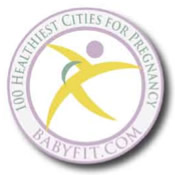 Although it is most often called morning sickness, a more appropriate term is "pregnancy sickness," as it can occur morning, noon or night. If you experience it, you're not alone. 50-90% of moms-to-be are affected by nausea and vomiting during pregnancy. The condition is annoying, unpleasant and unpredictable for most. However, it can be a serious and life-threatening condition for those who end up requiring hospitalization due to dehydration and malnutrition.
Although it is most often called morning sickness, a more appropriate term is "pregnancy sickness," as it can occur morning, noon or night. If you experience it, you're not alone. 50-90% of moms-to-be are affected by nausea and vomiting during pregnancy. The condition is annoying, unpleasant and unpredictable for most. However, it can be a serious and life-threatening condition for those who end up requiring hospitalization due to dehydration and malnutrition.
Current theories suggest that pregnancy sickness is related to an increase in various hormones that are present during pregnancy. The three main hormone suspects are: progesterone, human chorionic gonadotropin, and estrogen.
Pregnancy sickness usually subsides and the symptoms lessen by the end of the first trimester. However, for some moms-to-be the symptoms can remain until the baby is delivered. Symptoms can include:
- Nausea, queasiness, vomiting
- Possible headaches
- Dizziness
- Heightened sense of smell
- Irritability
- Increased salivation
- Dry mouth
- Motion sickness
- Parched, dry, cracked lips
- Shivering and chills
It is important to try and identify the symptoms you have and locate the triggers of these pregnancy sickness symptoms. Then by alternating your schedule, routine or environment, you can avoid or eliminate them. For example, some of these triggers may bring about a pregnancy sickness response:
- Fatigue
- Being suddenly awakened by the alarm clock
- Morning breath of your bed partner
- Bed movement caused by your partner
- An empty stomach
- Certain smells (either food or non-food)
- An airtight room with little ventilation
- Certain foods
Try to get the nausea under control and then return to your normal, healthy eating plan. What "sounds" good to eat? Does it help to settle your stomach? For some, this might be cheddar cheese and Granny Smith apples; but for others it might be potato chips and lemonade. Remember to include a beverage to help rehydrate the body. The minerals sodium, potassium, and magnesium are critical for muscle contraction and stomach emptying. Many have found relief with:
- Lemons (to lick or smell)
- Tart lemonade
- Salted potato chips, pretzels, tortilla chips
- Saltine crackers
- Fresh watermelon
- Dill pickles
- Tart Granny Smith apples
- Tangy ginger ale
- Frozen grapes
- Mashed or baked potatoes
- Water with a lime twist
- Gatorade
- Ginger tea
Do not hesitate to discuss the topic of pregnancy sickness with your health care provider. Ask for a referral to a Registered Dietitian who has experience in dealing with the nutritional care and management of pregnancy sickness. If your pregnancy sickness is severe and consistently prevents you from eating, drinking or keeping down nutrients, talk to your doctor about Hyperemesis Gravidarum.
|
 Although it is most often called morning sickness, a more appropriate term is "pregnancy sickness," as it can occur morning, noon or night. If you experience it, you're not alone. 50-90% of moms-to-be are affected by nausea and vomiting during pregnancy. The condition is annoying, unpleasant and unpredictable for most. However, it can be a serious and life-threatening condition for those who end up requiring hospitalization due to dehydration and malnutrition.
Although it is most often called morning sickness, a more appropriate term is "pregnancy sickness," as it can occur morning, noon or night. If you experience it, you're not alone. 50-90% of moms-to-be are affected by nausea and vomiting during pregnancy. The condition is annoying, unpleasant and unpredictable for most. However, it can be a serious and life-threatening condition for those who end up requiring hospitalization due to dehydration and malnutrition. 





Member Comments